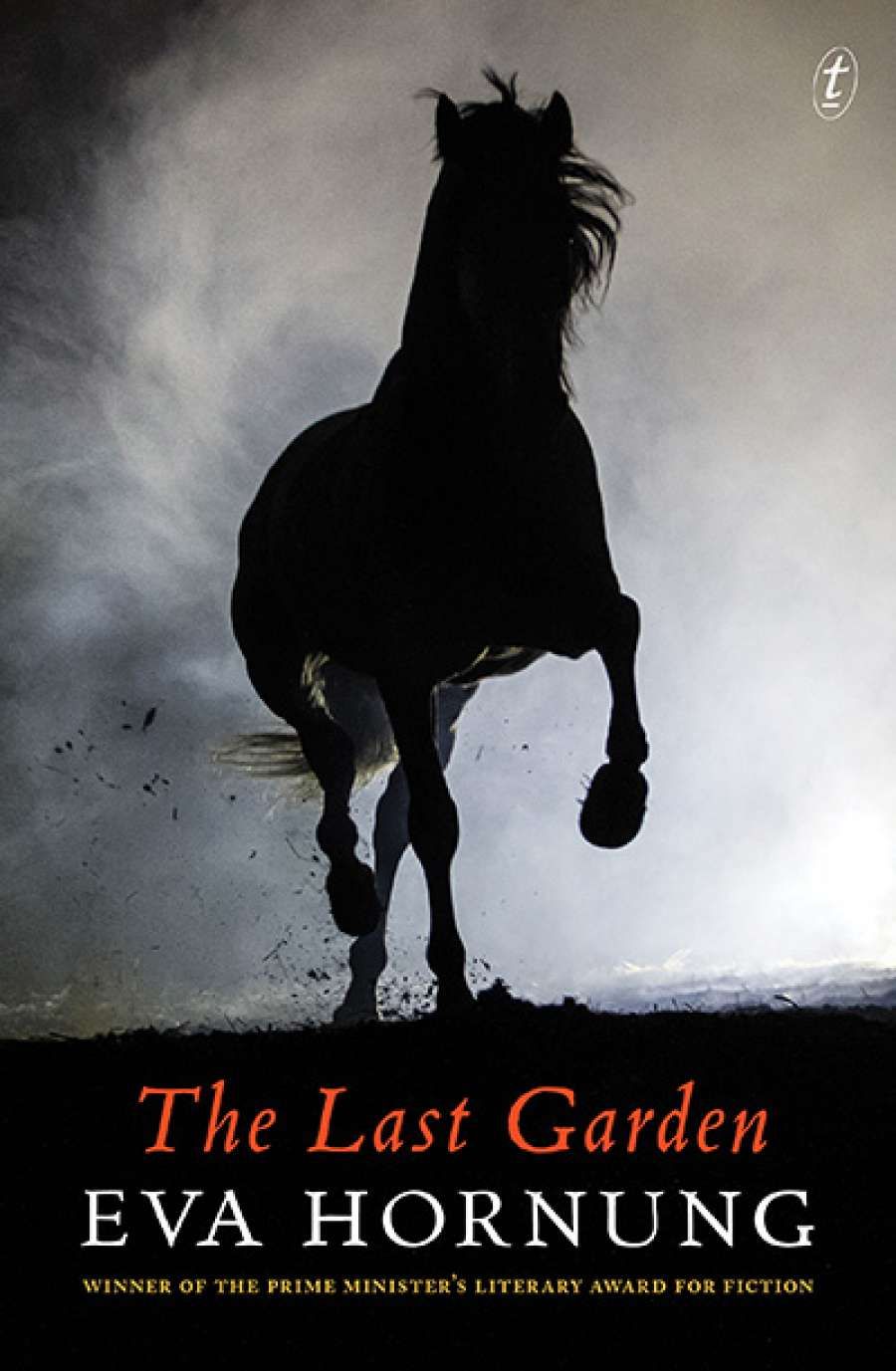
- Free Article: No
- Contents Category: Fiction
- Custom Article Title: Bernadette Brennan reviews 'The Last Garden' by Eva Hornung
- Review Article: Yes
- Online Only: No
- Book 1 Title: The Last Garden
- Book 1 Biblio: Text Publishing, $29.99 pb, 237 pp, 9781925498127
Some readers may find the epigraphs to each curiously named chapter – Hartung, Hornung, Lenzing, etc, – disconcerting. Written in an elevated register with smatterings of German and exhortations to worship, they offer advice on husbandry, appropriate labour, and domestic order. Eventually, we discover that they are excerpts from The Book of Seasons and that they chart the twelve months of Benedict’s journey of grief and healing. As I puzzled over and sometimes struggled with these epigraphs, they became increasingly compelling. I came to view them as a bell tolling, a bell that marked the passage of time while simultaneously straining to call the failing believers back to a fragile, unsustainable centre.
Hornung gives no clear indication of the time and place in which her narrative is set, though she tells us that ‘blacks’ and ‘drovers’ roam the land. At a crucial moment in Benedict’s self-destructive spiral, he approaches a campfire and is taken in by a group of Aborigines. His instinctive response is to assert ownership of the land, but wordlessly he surrenders himself to their care. They save his life and through them he discovers a new, sustaining means of being on and seeing the land. The Adnyamathanha language identifies these characters as being of the Flinders Ranges. No translation of their dialogue is offered. Nor is it needed. Like the many other forms of language operating in this novel, meaning is generated through sensation, heard emotion, and context.
For nearly two decades Hornung has been learning from, and working with, some of the few remaining Adnyamathanha speakers. Her recent Griffith Review essay (‘Wadu Matyidi: A long time gone’, with Buck McKenzie) gives a brief overview of the ‘potent, inspiring works of literature’ – books, film scripts, and songs – that have been created collaboratively by Uncle Buck McKenzie, Hornung, and students from the Inhaadi Adnyamathanha Ngawarla class she began with Gillian Bovoro. In using Adnyamathanha Ngawarla in The Last Garden, Hornung celebrates, and contributes to the preservation of, this ancient language. As she explains in her essay: ‘Adnyamathanha Ngawarla is something to be treasured here and now before it is too late.’
 Eva Hornung (photograph by Noni Martin)Readers of Hornung’s earlier fiction (mostly written under the name of Sallis) will recognise familiar themes and motifs in this latest novel. As in Hiam (1998), the witness to a traumatic death is propelled inexorably through an actual and psychic landscape of grief and must find a way to process the horror of their loss. Resonant with Fire Fire (2004), there is a community removed from the outside world. Like Acantia and Pa’s children before him, Benedict is irrevocably wounded by his parent’s actions. As a necessary step in his recovery, and assertion of his autonomy, he incinerates the family home. In the brilliant Dog Boy (2009), Hornung captured a young boy’s experience of being taken in and raised by a pack of dogs. Here again she probes the profound, sensual, healing connection between the human and animal worlds.
Eva Hornung (photograph by Noni Martin)Readers of Hornung’s earlier fiction (mostly written under the name of Sallis) will recognise familiar themes and motifs in this latest novel. As in Hiam (1998), the witness to a traumatic death is propelled inexorably through an actual and psychic landscape of grief and must find a way to process the horror of their loss. Resonant with Fire Fire (2004), there is a community removed from the outside world. Like Acantia and Pa’s children before him, Benedict is irrevocably wounded by his parent’s actions. As a necessary step in his recovery, and assertion of his autonomy, he incinerates the family home. In the brilliant Dog Boy (2009), Hornung captured a young boy’s experience of being taken in and raised by a pack of dogs. Here again she probes the profound, sensual, healing connection between the human and animal worlds.
There is a satisfying depth to this novel. Within the two central storylines there are layers and layers of stories and questions to do with exile, expulsion from gardens of innocence to experience, faith, language, fathers, sons, and the burdens of expectation. There is darkness, evil, and destruction, but there is also much beauty, goodness, and, ultimately, hope. Benedict’s pain and perception, Pastor Helfgott’s integrity and doubt, and the birth, death, and companionship of horses are all superbly conveyed in exquisite prose: ‘He had heard the sadness walled inside the pastor’s wife, the helplessness and affection aching away in the pastor. In this current, this voice beneath all voices, he heard everything.’ The Last Garden is by no means a long read but it is a big novel. Hornung’s characters, in all their flawed complexity, will stay with you long after the covers of this powerful book are closed.


Comments powered by CComment